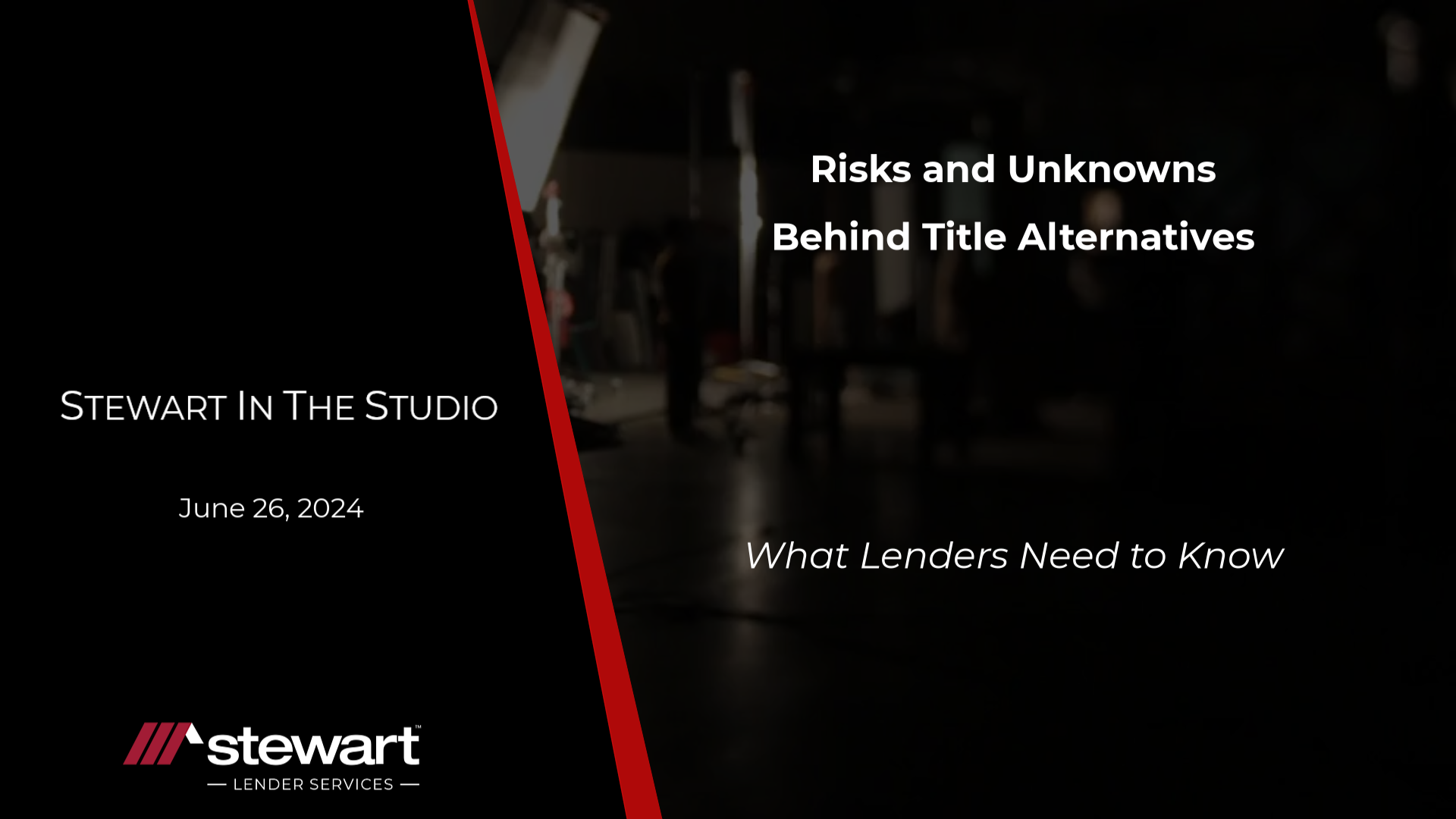Stewart in the Studio
Risks and Unknowns Behind Title Alternatives
Stewart in the Studio, hosted by Marvin Stone, SVP, Strategic Initiatives, is a fast-paced monthly podcast focused on issues vital to the mortgage lending industry. Tune in each month as Marvin and industry thought leaders discuss important trends and timely topics.
To speak to a Stewart Lender Services expert, please fill out the form to the right – we will get back to you shortly.
Stewart in the Studio Form

Episode Notes
- Government entities are trying to reduce costs to borrowers.
- Innovation in title insurance has outpaced inflation, with premiums reduce 30%+ in real dollars since 2018.
- TJ examines the risks and unknowns behind title alternatives and some challenges that need to be addressed.
- No uniformity in data standards and more than 3,300 counties makes normalizing that data to make it actionable expensive and time consuming.
- Discussions around the unintended consequences of waiver programs and AOLs.
Speaker Bios
Speakers for this episode include:

Marvin Stone
As Senior Vice President, Director of Strategic Initiatives for Stewart Lender Services, Marvin Stone is working on the digital transformation of the transaction process for Stewart’s full range of services that cover the entire mortgage lifecycle. He also contributes to industry technology by participating in MBA’s MISMO Title and Settlement Community of Practice and being part of Stewart’s generative AI council.
Stone has been with Stewart since 2007 and has managed various technology, process and compliance initiatives for the direct, agency and centralized title divisions. Before joining Stewart, he was CIO for a large title company on the West Coast and held strategic roles with other national underwriters and mortgage lenders.
Stone is a frequent speaker at industry events and is sought out for his commentary on industry trends.

T.J. Harrington
T.J. Harrington serves Stewart Lender Services (SLS) as Senior Vice President of Sales and Product Enablement. In this role, T.J. focuses on expanding Stewart’s reach and influence in the title, appraisal/valuation and credit/verification industries.
His extensive experience includes serving as general counsel and strategy-focused roles at major lender services and bank-owned mortgage and title operations.

Episode 11 Transcript
View Full Transcript
E11: Risks and Unknowns Behind Title Alternatives
Marvin: So welcome TJ. You were featured last week on the TMC Rundown as really the featured guest talking about how title and government entities are trying to reduce costs. Uh, can you talk about the progress the title industry has made to date and maybe what’s holding back further savings?
TJ: Thanks, Marvin. I think we’re all feeling the pain in the real estate market right now. Affordability is as big a concern as it ever has been. Rates are high. Price appreciation continues to be driven up. I think we’re all looking for ways to make, to make the transactions less expensive for consumers.
You see the GSEs looking at title alternatives and waiver programs. You see FHFA opening the box for programs trying to make it have more availability of credit overall. You have VA and FHA looking at their particular programs trying to find ways to reduce the guarantee fees or other insurance as best they can.
I think we’re all digging deep to try and find ways to reduce costs. It’s our responsibility as an industry to do that for the consumer in that we are responsible for the American dream. That’s what we march on every day and it’s so important to us. In the title world,
I think we’ve seen innovation that is outpaced inflation. And evidence of that, we’ve seen premiums reduce in real dollars, I think, in 35 or 36 percent going back to 2018. What has driven that has been the more use of title data, expansion of plants, the use of title engines with credit data. That has driven efficiencies. We’ve seen the rise of eSign and eClosings and eRecordings, uh, helping with post close and efficiencies in the escrow process.
And overall that has driven consumer cost down. What we are still stuck with is the fact that there’s 3300 counties nationally with every recorder’s office having their own system, their own data sets, their own way of classifying documents. There’s not uniformity in data standards the way that there is in MISMO.
So, ultimately we are normalizing that data to make it actionable, which is expensive and time consuming. I think we’re doing our best with that and the data sets are getting better. But, ultimately, that balkanization, the fractionalization of data makes it difficult. Uh, we also see a rise in fraud.
We see a rise in concerns around money laundering -things that we’re having to implement in the title industry to prevent those risks. So ultimately, you know, we are innovating as fast as we can, we’re beating out inflation, but the risks keep rising and so it’s one of those things where we are doing our best to drive efficiencies. And, we’ll continue to do so.
But, in the meantime, it’s going to be getting more data uniformity, getting a uniform data set, getting blockchain, whatever form it might take in the future from a record standpoint, being able to use prior records, I think is the key to it.
Marvin: So then you talked about the risks and unknowns behind some of the alternative title products. Where did you land on that?
TJ: So, really, when we talk about alternative title products and process, we’re talking about waivers and AOLs.
And I appreciate the pain in housing, everyone’s trying to innovate in our space, trying to find consumer benefit, lower costs, and really do something different where they can. Ultimately, though, what we’ve come up with is just the scenarios and use cases that we’ve seen that would be appropriate for a waiver or fine savings in an AOL.
There’s unintended consequences to that. I think we looked at first, in the waiver scenario, where you kind of skim the cream, the least risky, the files where maybe it was recently purchased home in the last two to five years, what you end up doing there is adversely selecting for the rest of the pool.
So, today we average cost out all of our files for curative for the hard costs and the work being done. And when you remove the least risky files, you ultimately increase costs for everybody else. That’s the way insurance works. You see that in risk allocated pools from anywhere from car insurance to flood insurance.
When you have a broader pool, you have better pricing for everybody. So it’s kind of a beggar that neighbor. The other risk, specifically around the waivers, is that it’s going to be a data driven decision somewhere up the chain prior to a full search actually being done. And, as a result of that, you’re going to have the availability of a waiver in the most affluent data rich areas – which means you’re not helping the consumers that you want to help. Really the idea behind the waiver was, can we reach down and lift people up who need the help? If you’re relying on waivers, ultimately that goes to the most affluent Americans and I, I don’t think that’s where we’re intending to drive the help. For AOLs, you know, really, when you look at rate structures across the country in a large majority of states, you have the centralized quote unquote bucket rates, as we call them, where you have your tiered rates where it’s a flat fee in a certain tranche of loan size or purchase amount and for the most part, those bucket rates are competitively priced and many scenarios less expensive than an attorney opinion letter.
And when you remove title from the equation, you may be introducing risk or expense to the equation that you may not have been counting. Florida, example, requires the participation of an attorney for the closing escrow when title is not being written. Speaking with attorneys in the state of Florida, they would be charging an amount for closing that would be even higher than what it would be with title insurance. So it’s one of those things where I think there’s room for innovation. We’re driving it the right way. We just have to be aware of the unintended consequences of making a change.
Marvin: So let’s talk about the most important person in the entire transaction, which is the consumer and, you know, keeping in mind that most consumers are not experts in protecting their property rights.
How should consumers be protected through the various products that are available today?
TJ: Marvin, it’s a great point. We’ve seen a rise in fraud. We’ve seen a vacant lot fraud. We’ve seen seller impersonation fraud and you see the stories in the news today. You know, really part of our job as title insurance professionals is curating the public record.
There is 4 and a half million or so documents recorded on average per year. The registries of deeds are walk in. You can walk in and record almost anything you presented for recording. As long as it meets the requirements, ultimately, it’ll be put to the public record. And there’s not really a strong filter to protect the consumer or the homeowner…anybody from the effect of those public records. There’s a common law cause of action called slander of title and so just the existence of that means that that is a thing that happens. People put things of record, for whatever reason, that ultimately impact the ability to buy, sell, mortgage, whatever a property and part of our role in the title transaction, whether it be on the purchase side or on a refi, we curate those records.
We do curative work. We clean the records as we go to ensure ease of transaction for the future. Um, You know, I think about a lot of the advertisement to see if their title lock and other things like that. Ultimately, those aren’t effective. You know, I think it’s more they’ll let you know, but there’s not a lot that they can actually do for you as far as curative goals.
And, ultimately, the recourse is a title policy. And, it’s one of those things where it’s a low frequency because we do a nice job curating the records. You know, historically, the claims have been between 2 and 4 percent because title is preventative medicine. That curative steps that we take ultimately reduce the risk on the end and the expense that we have in the title world is that effort and is that curation. So I would tell you that the structure of the world today in the way that we do business focused around title and is it future transactions are kind of dependent on the existence of that manufacturing process that happened previously to make sure that we’re sanctified going forward. And, where risk exists, you know, we keep innovating as professionals to prevent those risks. You know, there’s things that we’re doing in the fraud prevention. There’s things that we’re doing in wire prevention. We are an important partner for any money laundering. You know, I think we do our part. So, I don’t know that the other alternative products anticipate those kinds of future looking solutions.
I think they’re very focused on today and attacking costs without being mindful of the future.
Marvin: Well, that’s great additional detail, T. J. I really want to thank you for that and just really kind of explaining the overall landscape here. So, uh, great. Thanks for being on Stewart in the studio and we’ll talk again soon.
Ready to get started with our team of experts?
Get in touch with us today to speak to one of our real estate valuation experts and learn how SVI can help your organization succeed.




